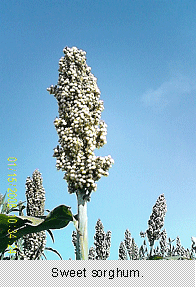 R&D on sweet sorghum
R&D on sweet sorghum
In support to the Biofuels Act of 2006, PCARRD has developed and packaged an Integrated Sweet Sorghum Research and Development (R&D) Program. The program is envisioned to help develop a bioethanol industry from sweet sorghum in the country.
The Department of Science and Technology (DOST), through PCARRD, initially funds three out of the nine component projects of the program, a subprogram under the PCARRD Integrated Biofuels R&D Program, which started in July 2007.
The sweet sorghum R&D program includes priority research areas on: (1) germplasm improvement, (2) performance trials of promising varieties in selected regions, (3) development of cultural management practices; (4) integrated pest management strategies, and (5) processing of sweet sorghum into bioethanol.
The three initial projects would lead to the development of sweet sorghum varieties locally best adapted in selected locations, as well as cultural management technologies, which would optimize stalk and sugar yields. The projects are being implemented through the leadership of the University of the Philippines Los Baños (UPLB) and Mariano Marcos State University (MMSU), in collaboration with other state universities and colleges; selected research stations of the Department of Agriculture (DA); local government units; the private sector; and the International Crops Research Institute for the Semi-Arid Tropics (ICRISAT). To date, DOST-PCARRD has invested about P14 million in the program.
Noting sweet sorghum’s potential as a fuel alternative, the private sector is supporting the commercialization of the crop for ethanol production. For one, the San Carlos Bioenergy, Inc. in San Carlos City, Negros Occidental is setting up a bioenergy processing plant, for which sweet sorghum will be considered as one of the feedstocks. The plant will be operational by November 2008.
Sweet sorghum is a priority for bioethanol production because it can be grown in a wide range of environmental conditions. Further, ethanol production from sweet sorghum is cheaper than production from corn and sugarcane.
Since 2005, PCARRD together with DA-Bureau of Agricultural Research (DA-BAR) has been supporting adaptation trials of introduced varieties of sweet sorghum from ICRISAT.
Review and Planning
After six months of implementation, a Mid-Term Review and Planning Workshop for the DOST-PCARRD Sweet Sorghum Program was held on February 11 - 12, 2008 at the PCARRD Headquarters, Los Baños, Laguna. This activity brought together both implementing and cooperating agencies composed of MMSU, UPLB, Isabela State University, Pangasinan State University, Tarlac College of Agriculture, UPLB College of Agriculture-La Granja, and Central Mindanao University. Evaluators from the Department of Agriculture - Bureau of Agricultural Research (DA-BAR), Philippine Council for the Industry and Energy Research and development (PCIERD), Pampanga Agricultural College (PAC), UPLB, and PCARRD attended the review. The activity also served as a venue to discuss problems and other concerns encountered during project implementations so that appropriate adjustments can be made.
The mid-term review and planning workshop was a timely activity because the accomplishments of the sweet sorghum R&D projects will be highlighted during the First National Sweet Sorghum R&D Review and Planning Conference to be held at the MMSU, Batac, Ilocos Norte on March 12 -¬¬ 15.
The MMSU-conference aims to (1) summarize current research, development and extension (RDE) activities on sweet sorghum in the Philippines for better understanding of the need and prospects of sweet sorghum as a multi-purpose crop for biofuel, food, feed, and forage; (2) identify key options and research priorities in designing and evaluating integrated food and energy production systems; (3) develop a framework for RDE on sweet sorghum and formulated strategies for immediate and long-term activities to hasten its full utilization as a multi-crop with emphasis on feedstock for bioethanol production; and (4) organize the manpower, infrastructure, and laboratory needs of a Biofuel RDE in support of the industry.
PCARRD co-sponsored the conference in collaboration with MMSU, DA-BAR, and CHED.
